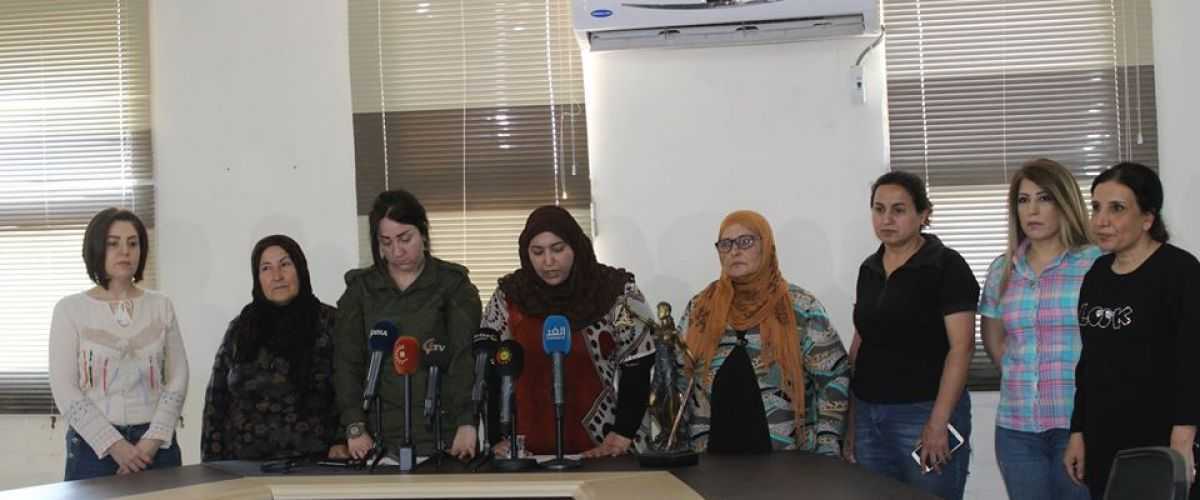In spite of legal protections and quotas, women are still not equal under the Autonomous Administration
In spite of legal protections, women still suffer from cultural resistance to their adoption of a greater role in AA areas.
19 July 2020
A representative of the Women’s Justice Council announces statistics on domestic violence against women during the COVID-19 lockdown, (Social Justice Council in al-Jazira), 28/06/2020
AMMAN — Contrary to the general norm in the Arab world, women in the Kurdish-dominated Autonomous Administration of North and East Syria (AA) appear to play a more prominent role in public institutions since its founding by the (Kurdish) Democratic Union Party (PYD) in mid-November of 2013.
Women even participated in the fighting against the Islamic State (ISIS), especially under the Women’s Protection Units (YPJ) that were established in 2012 as one of the military wings of the YPD and its military force, the People’s Protection Units (YPG). The latter later became the backbone of the Syrian Democratic Forces (SDF).
In addition, commissions and committees concerned with women’s affairs were established across all public and societal bodies and institutions. On top of that, a joint male and female presidency system was adopted in the AA institutions. Additionally, the so-called “social contract” that is considered to be the AA’s local constitution, has stipulated that women should have at least 50% representation in the AA’s institutions. This percentage has risen to 70% in some institutions such as the case of the education sector, Zaynab Muhammad, the president of the Women’s Committee in the Jazira region—one of the two main Regions of the AA—told Syria Direct.
However, this extensive representation of women, as well as the rights provided by local legislation appear to be somewhat at odds with the lived experience of women in AA territory.
As a morbid example of this, during the coronavirus (COVID-19) lockdown, the number of incidents of domestic violence committed against women soared. From March 23 to June 16, the AA-affiliated Women’s Justice Council documented eight cases of suicide, 14 suicide attempts, 126 cases of domestic violence and 17 cases of women being murdered.
While Muhammad attributes this to the “customs and traditions society still maintains,” journalist Soline Amine highlights that “the AA has combined the reconciliation committees which reflect the dominant tribal demography with women’s affairs committees, the women’s administration and councils across northeast Syria.” The AA also “emphasized the protection of women against crimes such as harassment, assault, rape, abuse, bullying and child marriage in its laws,” Amine told Syria Direct.
However, with “society being tribal and closed by nature, and reluctant to discuss its issues publicly,” Muhammad said, “it attempts to solve such issues through reconciliation between families and individuals under the oversight of the communes—the smallest and most effective administrative unit in society.”
For Ghandi Safar, the director of Eridu Center for Civil Society and Democracy in the city of Qamishli in northeast Syria, the “law is still not sufficient, both in terms of its content and its implementation.”
“Many women are afraid of resorting to courts and when women fear society and scandals, it means that the problem lies in the law itself,” Safar told Syria Direct.
The truth about the institutional presence
The gap between legislation and the real living conditions for women begs the question of whether the extensive presence of women in AA institutions translates to an effective role in the decision-making process, rather than just nominal positions of power.
It is “erroneous to state that the presence of women in AA institutions, in general, is just a formality,” Safar said. “While some institutions are just formal, there are women who actually do perform their roles.” He also pointed out that the AA’s mechanism for representing women “was not a result of a certain level of awareness or social effort, but was rather imposed by the law.”
Drawing on her personal experience, Amine also believes that “there is a real role for women in the AA’s administrations.” As an example, she recalled a particular meeting in the countryside of Deir e-Zor that was “postponed because of the absence of one of the [female] leaders.”
For her part, Fawza Youssef, a member of the co-presidency in the PYD, considered that “at the beginning of the AA, and due to a lack of experience, there was some sexism. With time, however, this was largely overcome.” However, Youssef admitted that “tribal mentalities, customs and traditions are still present. And above all else, there is a view that women are inferior. This negatively impacts the ability of women to play a more effective role.”
Zainab Muhammad echoed the same opinion, blaming “men’s authoritarian mentality and their refusal to accept [what they view as] a ‘powerless and weak woman’.”
Safar, however, believes that “the AA has only advocated for women within a certain institutional framework under the AA, and that thrusting women into certain institutions in the way that it is being done now is actually harmful.”
The report was originally published in Arabic, and translated into English by Ahmad El-Amin. This copy reflects minor changes made on 20/7/2020 at 12:20 pm.







